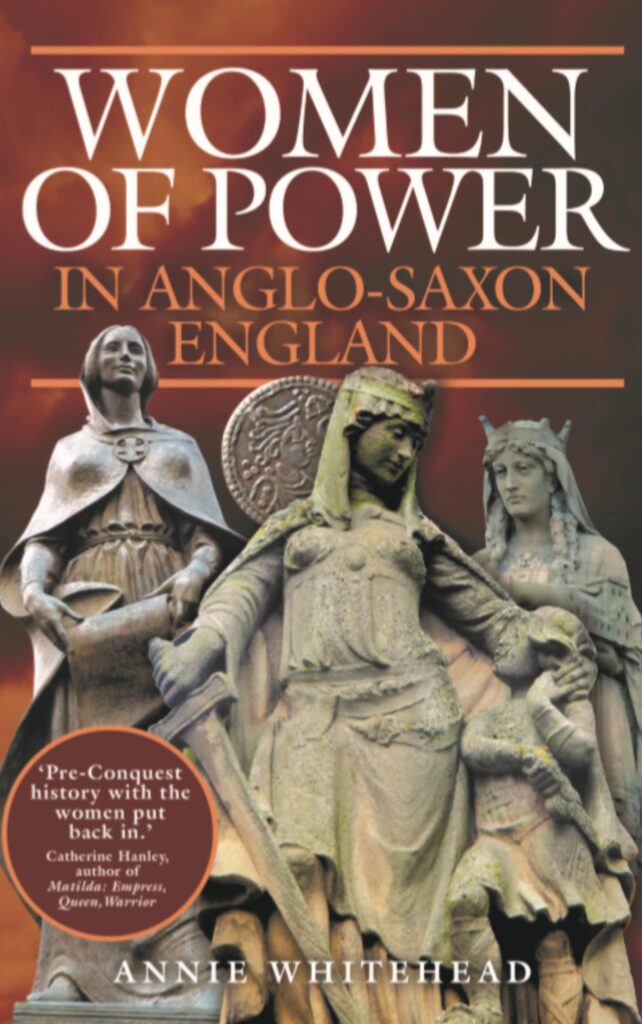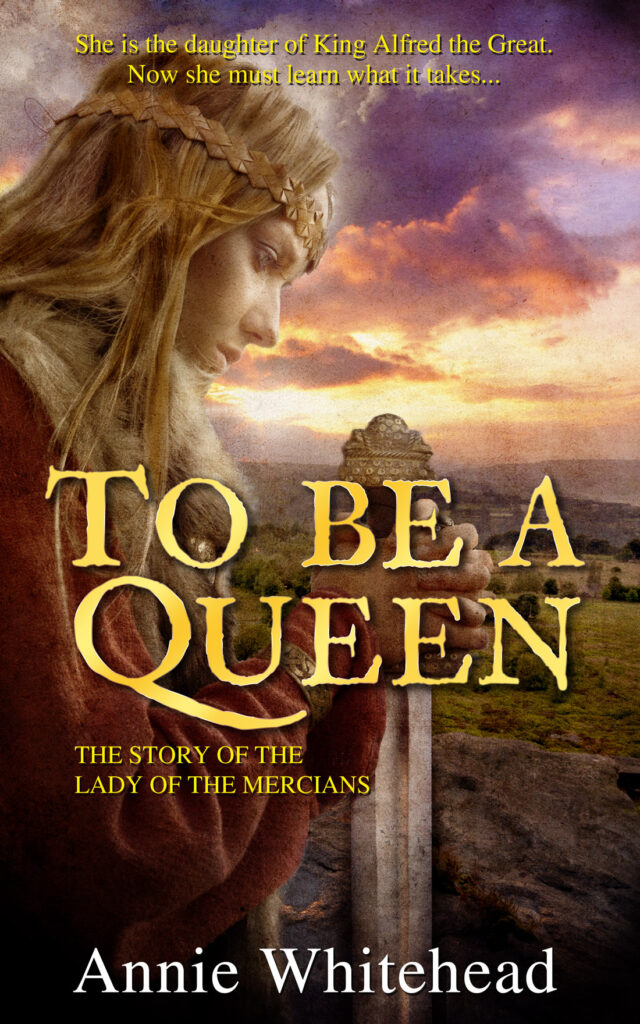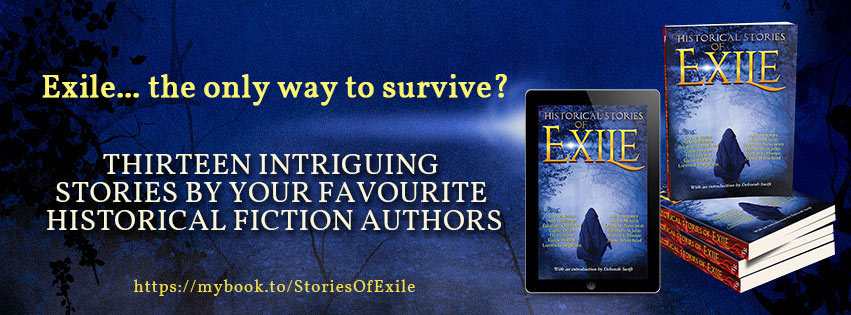 I’m delighted to welcome Annie Whitehead to the blog to talk about being in Exile. She’s a prize-winning writer, historian, and elected Fellow of the Royal Historical Society, and has written four award-winning novels set in ‘Anglo-Saxon’ Mercia, including To Be A Queen, the story of Æthelflæd, Lady of the Mercians.
I’m delighted to welcome Annie Whitehead to the blog to talk about being in Exile. She’s a prize-winning writer, historian, and elected Fellow of the Royal Historical Society, and has written four award-winning novels set in ‘Anglo-Saxon’ Mercia, including To Be A Queen, the story of Æthelflæd, Lady of the Mercians.
She’s contributed to fiction and nonfiction anthologies and written for various magazines and was the winner of the inaugural Historical Writers’ Association/Dorothy Dunnett Prize 2017 and is now a judge for that same competition. Among her credits are as judge for the Historical Novel Society Short Story Competition, twice a prize winner in the Mail on Sunday Novel Writing Competition, First Prize in the 2012 New Writer Magazine’s Prose and Poetry Competition. She’s also been a finalist in the Tom Howard Prize for non-fiction, and shortlisted for the Exeter Story Prize and Trisha Ashley Award 2021.
Her nonfiction books, Mercia: The Rise and Fall of a Kingdom and Women of Power in Anglo-Saxon England, are published by Amberley Books and Pen & Sword Books. Added to her recent rcontribution to a new history of English monarchs, published by Hodder & Stoughton in 2023, she’s currently writing a book on Murder in Anglo-Saxon England, to be published by Amberley in 2024.
Annie is the first of my author guests who are fellow contributors to the recently released Historical Stories of Exile. She knows a thing or two about the Anglo-Saxon period in England! Let yourself be entranced by romance, the force of history, heartache and exile.
The world of the Anglo-Saxons is probably less familiar than some periods of history, though The Last Kingdom has helped to popularise it. Even those who don’t know much about the period will have heard of 1066, and we all know that in that year Anglo-Saxon England became Anglo-Norman. We also know the key players: Harald Hardrada of Norway, William of Normandy, Harold Godwineson of England – and poor Edith Swanneck, who identified Harold’s body after the battle of Hastings.
Harold and Edith’s tale is romantic, poignant, heart-wrenching. She was, seemingly, his soulmate, his handfast woman, and she alone, apparently, could identify him because of secret markings on his body that only she was familiar with.
Yet she was not his wife. That title belonged to another woman, another Edith (actually Edith Swanneck’s name wasn’t Edith, it was Eadgifu, but let’s not complicate matters!) but Edith in Old English is spelled Ealdgyth, and that’s the name I’ve gone with in my story about her for ‘Exile’.
1066 might be the one date that sticks in everyone’s mind, but Lady Godiva is surely the one figure from Anglo-Saxon history whom everyone has heard of. She might not have ridden naked through the streets of Coventry as per the legend, but she was certainly a real person. Rich, famous, and influential, she was part of a huge family with political power in the Midlands, a family which included King Cnut’s first wife, Ælfgifu of Northampton, who ruled Norway on behalf of their son. The family’s matriarch was taken hostage by the Vikings and is one of the few women named in the Anglo-Saxon Chronicles. She was called Wulfrun, and the city of Wolverhampton is named after her.
Ealdgyth was Godiva’s granddaughter, and she became a queen twice over. But for a quirk of fate, our monarchy would be descended from her, and yet she is all but forgotten. I’ve written about her before, in our anthology 1066 Turned Upside Down and my research into her life is ongoing.
What is it about the women of history, and this period particularly, that makes them so seemingly forgettable, unworthy of mention by most of the chroniclers, unless it is to denounce them, or place them at the heart of salacious tales? My last nonfiction book was Women of power in Anglo-Saxon England and my research revealed many women who were influential, held positions of power and often ruled kingdoms as regents. One even ruled one in her own right and, again, The Last Kingdom has done much to bring her story into the light: Æthelflæd, Lady of the Mercians. It was the women who founded the first monasteries, one even educating five future bishops.
One thing that stands out though, is that, although they were vastly privileged, even the elite were not immune to tragedy. We’re told that a number of Alfred the Great’s children died before they reached maturity, and who would argue that his and his wife’s suffering was any less great than that of modern couples losing their child/ren? We are also told of women who travelled great distances, leaving their homes, families and loved ones to marry kings who lived hundreds of miles away.
A journey from Kent to Bamburgh in Northumberland would take over seven hours by car. How long must it have taken the women of the royal house of Kent to journey there to marry the kings of Northumbria, and how did they feel as they set out, knowing that in all likelihood they would never see their homes, or families again? I could have chosen any one of these women to write about for our Exile collection. Their stories are filled with loss, hope, longing, and survival.
I had already written my story about Ealdgyth, for a different project (which Helen Hollick explains in her afterword, talking about how Exile came about) but the reason I chose her for my subject was simply that she intrigues me. There is much that remains unknown about her – ironic given her status as a queen twice over – and I picture her as a resilient, resourceful woman. She endured a great deal, and the emotions provoked will, I hope, resonate with a modern audience.
She was, as I mentioned, part of an extended family whose women showed remarkable courage, leadership, and endurance. I cast her in the same mould. I have walked in some of her footsteps, having visited two of the locations in the story: Chester, and Rhuddlan in North Wales. Whilst I covet Ealdgyth’s colourful Anglo-Saxon clothes and frankly gorgeous jewellery, I can only be thankful that I’ve not walked metaphorically in her footsteps, nor those of any of the intrepid women of the era.
_________
Connect with Annie
Website :https://anniewhiteheadauthor.co.uk/
Blog: https://anniewhitehead2.blogspot.com/
Twitter/X: https://twitter.com/AnnieWHistory
Facebook: https://www.facebook.com/anniewhiteheadauthor/
Instagram: https://www.instagram.com/anniewhiteheadauthor/
BlueSky: https://bsky.app/profile/anniehistory.bsky.social
_________
Two wonderful books by Annie:
Women of Power in Anglo-Saxon England (Non-fiction)
 Many Anglo-Saxon kings are familiar. Æthelred the Unready is one, yet less is written of his wife, who was consort of two kings and championed one of her sons over the others, or his mother who was an anointed queen and powerful regent, but was also accused of witchcraft and regicide. A royal abbess educated five bishops and was instrumental in deciding the date of Easter; another took on the might of Canterbury and Rome and was accused by the monks of fratricide.
Many Anglo-Saxon kings are familiar. Æthelred the Unready is one, yet less is written of his wife, who was consort of two kings and championed one of her sons over the others, or his mother who was an anointed queen and powerful regent, but was also accused of witchcraft and regicide. A royal abbess educated five bishops and was instrumental in deciding the date of Easter; another took on the might of Canterbury and Rome and was accused by the monks of fratricide.
Anglo-Saxon women were prized for their bloodlines – one had such rich blood that it sparked a war – and one was appointed regent of a foreign country. Royal mothers wielded power; Eadgifu, wife of Edward the Elder, maintained a position of authority during the reigns of both her sons. Æthelflaed, Lady of the Mercians, was a queen in all but name, while few have heard of Queen Seaxburh, who ruled Wessex, or Queen Cynethryth, who issued her own coinage. She, too, was accused of murder, but was also, like many of the royal women, literate and highly-educated.
From seventh-century Northumbria to eleventh-century Wessex and making extensive use of primary sources, Women of Power in Anglo-Saxon England examines the lives of individual women in a way that has often been done for the Anglo-Saxon men but not for their wives, sisters, mothers and daughters. It tells their stories: those who ruled and schemed, the peace-weavers and the warrior women, the saints and the sinners. It explores, and restores, their reputations.
Available to buy here: https://mybook.to/WomeninPower
To Be A Queen (Historical fiction)
 One family, two kingdoms, one common enemy …
One family, two kingdoms, one common enemy …
This is the true story of Æthelflæd, the ‘Lady of the Mercians’, daughter of Alfred the Great. She was the only female leader of an Anglo-Saxon kingdom.
Born into the royal house of Wessex at the height of the Viking wars, she is sent to her aunt in Mercia as a foster-child, only to return home when the Vikings overrun Mercia. In Wessex, she witnesses another Viking attack and this compounds her fear of the enemy.
She falls in love with a Mercian lord but is heartbroken to be given as bride to the ruler of Mercia to seal the alliance between the two Anglo-Saxon kingdoms.
She must learn to subjugate her feelings for her first love, overcome her indifference to her husband and win the hearts of the Mercians who despise her as a foreigner and twice make an attempt on her life.
When her husband falls ill and is incapacitated, she has to learn to rule and lead an army in his stead. Eventually she must fight to save her adopted Mercia from the Vikings and, ultimately, her own brother.
To Be A Queen was Long-listed for HNS Indie Book of the Year 2016 and has been awarded an indieBRAG Gold Medallion.
Available to buy here: https://mybook.to/To-Be-A-Queen
Alison Morton is the author of Roma Nova thrillers – INCEPTIO, CARINA (novella), PERFIDITAS, SUCCESSIO, AURELIA, NEXUS (novella), INSURRECTIO and RETALIO, and ROMA NOVA EXTRA, a collection of short stories. Audiobooks are available for four of the series. Double Identity, a contemporary conspiracy, starts a new series of thrillers. JULIA PRIMA, Roma Nova story set in the late 4th century, starts the Foundation stories. The sequel, EXSILIUM, will be out in January 2024.
Find out more about Roma Nova, its origins, stories and heroines and taste world the latest contemporary thriller Double Identity… Download ‘Welcome to Alison Morton’s Thriller Worlds’, a FREE eBook, as a thank you gift when you sign up to Alison’s monthly email update. You’ll also be among the first to know about news and book progress before everybody else, and take part in giveaways.














I enjoyed the story and interesting to hear how it relates to Annie’s other books.
That period is so fascinating with a good number of strong personalities driving events, especially the women of the time.
Thanks so much Deborah!
A wonderful story. Annie’s Women of Power was one of my research books as I was working out the conflicts facing my protagonist Gwenna in my soon-to-be-published Empire’s Passing. While my early-medieval world is fictional, the intertwined issues of borders and trade and settlement and marriage alliances still exist, and seeing how real women of power faced these (and other) issues was instructive.
Thanks Marian – it’s gratifying to know that the book was useful to you 🙂
Thanks so much for hosting today Alison 🙂
Always a pleasure, Annie!
Yes, these ladies paid a heavy price for the jewels and trappings and high position, didn’t they? It’s good to read about but to live? Not so much.
As Annie points out, while it’s fascinating to read about the lives of these elite women, I think we’re all relieved to be living in the 21st century.
Exile is such a fabulous collection of stories written by some equally fabulous authors – it’s been hard work to produce the finished book but so worth the effort! Thanks for posting about Annie’s story today, Alison – and thank you, Annie, for being one of the team!
You must accept our thanks for putting it all together, Helen! I’m looking forward to some of our colleagues’ motivations over the next couple of weeks.
This is such a great tale, and it’s always fascinating to read the “story behind the story”.
I love finding out about the motivation behind a story which can be as intriguing as the story itself!
Thanks so much!
As always, Annie’s writing sings–and I love learning about the lives of women we’d otherwise know little if nothing about.
So true. We learn about the men’s stories and the dates, but women’s stories at this time are often obscured.
That’s so lovely Amy, thank you 🙂